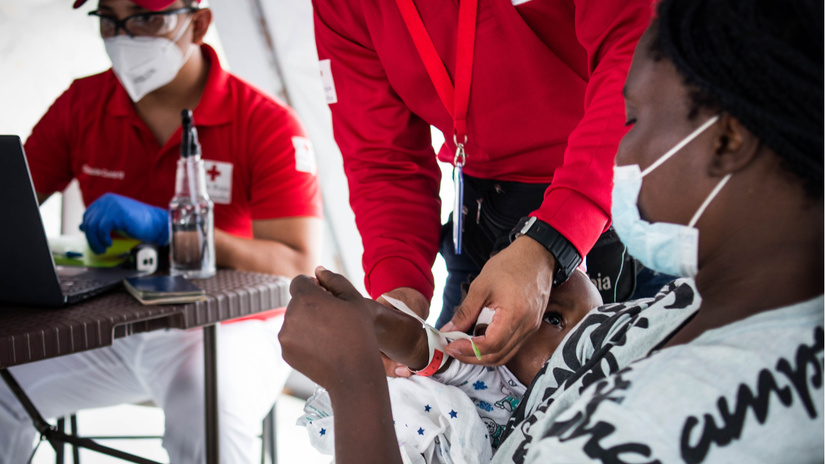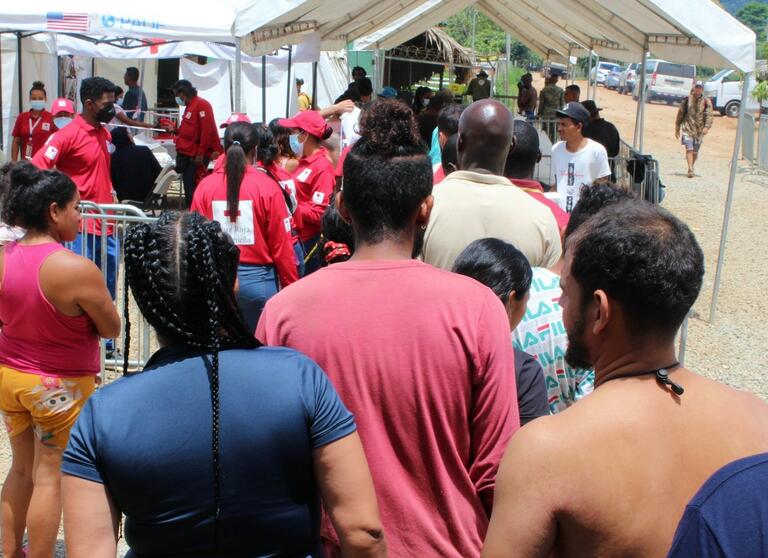Panama City, 1 August 2022 - The International Federation of Red Cross and Red Crescent Societies (IFRC) is ramping up its response to provide urgent humanitarian assistance and protection to 210,000 people on the move by land northwards through Central America and Mexico.
Along migratory routes, many people suffer accidents and injuries, face extortion and sexual violence, or disappear and are separated from their families. Others are killed or die from disease or environmental conditions.
According to official data, since January 2022, there is a concerning increase in the number of migrants and refugees in Central America and Mexico compared to previous years. Irregular migration has increased an 85% in Panama, 689% in Honduras, and 108% in Mexico. If this upward trend continues in the coming months, an estimated 500,000 people* would require humanitarian assistance.
Roger Alonso, IFRC Head of Disaster, Crises and Climate Unit, said:
“Local Red Cross teams, from Panama to Mexico, confirm that dramatic spike in the number of migrants moving northwards. We are especially concerned for women, children, the disabled, older people, and LGBTQI migrants. They are at extreme risk and need medical and mental health assistance, access to food and water, information, connectivity, and resources to cover vital expenses such as paying for safe places to sleep.”
Most of the migrants and refugees in transit through the region are from Cuba, Venezuela, and Haiti. Nationals from Honduras, Guatemala, Nicaragua, and Mexico also continue heading north. The main reasons for migrating include improving their income, escaping violence, reuniting with family members, and recovering from the impact of recurring disasters and extreme weather events.
In Panama, in June 2022 alone, 15,000 migrants crossed the perilous Darien Gap – 500 people per day. Out of every 100 of them, 16 are children. In Costa Rica, 441 persons a day entered from Panama in May 2022, an increase of 158% compared to April 2022. Nearly 24,000 Cubans arrived in Nicaragua from January to May 2022, while in El Salvador, Guatemala, Honduras, and Mexico there is a significant increase in the number of returnees.
In this challenging context, the IFRC has launched a 28 million CHF** Emergency Appeal to support 210,000 people on the move during the next 12 months. Red Cross Societies in Panama, Costa Rica, Nicaragua, Honduras, El Salvador, Guatemala, and Mexico will provide migrants, refugees, and returnees with health care, mental health support, access to water and sanitation services, and cash for them to cover essential needs, such as accommodation or food.
Martha Keays, IFRC Regional Director for the Americas, said:
It is unacceptable that migrating continues to cost people their dignity and their lives. This is why we are scaling up our current response and standing up our vital emergency support along migratory routes. We call on governments, our partners, and donors to join this humanitarian action. Protecting people migrating in a desperate situation and defending their rights, disregarding their status is a humanitarian imperative and a collective duty. The devastating socioeconomic effects in the wake of the COVID-19 pandemic, the climate crisis, continuing political crises, and disasters will continue to ramp up exponentially population movements. The challenge ahead of us is titanic.”
The Red Cross’ response will prioritize attention along the routes where most migrants and displaced persons face bureaucratic barriers, hostile climates, stigma, discrimination, violence, insecurity, and even loss of life. The support will be provided through the Red Cross network of 20 Humanitarian Service Points*** in Central America and Mexico. These are neutral, safe spaces—whether fixed or mobile—where people on the move can access health care, psychosocial support, and information, among other services.
In Panama, for instance, the Humanitarian Service Point provides migrants crossing the Darien Gap with first aid, health care for pregnant women and children, psychosocial support, clean water, access to mobile phones, and information about the risks and services they may find along their journey. People who require specialized health support are referred to public services. With migration flows increasing in the region, this model will continue to save lives and reduce suffering.
The IFRC and its network will also work with origin, transit, and host communities to address environmental-, climate-, and livelihood-related issues that may trigger population movements.
For more information or to arrange an interview:
- In Panama: Susana Arroyo Barrantes, [email protected]
- In Panama: Maria Langman, [email protected], +507 6550 1090
- In Geneva: Jenelle Eli, [email protected], +1 202 603 6803
Notes
*The 500,000 people possibly affected have been estimated taking into account irregular crossing entries and reports from July to December 2021, considering a 45% increase scenario (most countries are above 100% increase ) and at least one aggregate of 173,176 from January to June 2022.
**$29.2 million.
***Six in Guatemala, eight in Mexico, five in Honduras and one in Panama.





